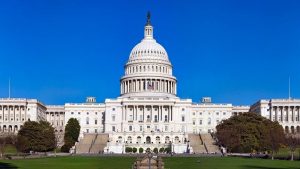During Cybersecurity Awareness Month, the Department of Education announced the 2022 recipients of the Presidential Cybersecurity Education Award.
Following its annual conference earlier this month, the National Association of State Chief Information Officers (NASCIO) announced its new executive leadership for the coming program year.
County-level election workers in at least two battleground states saw a surge in attempted phishing exploits in the runup to the 2022 midterm election primary contests, according to a new report from cybersecurity firm Trellix.
The Federal Communications Commission (FCC) awarded another round of funding for its Emergency Connectivity Fund (ECF) on Oct. 19. The $78 million will benefit approximately 175,000 students, bringing the total of those awarded with broadband services and devices to over 14 million.
In a bid to increase access to state services, as well as save residents time and money, Colorado Gov. Jared Polis has launched the Colorado Digital Government Strategic Plan.
State CIOs and about 900 of their closest vendor friends gathered once again for the National Association of State CIO’s (NASCIO) 53rd annual fall conference October 9-12 in Louisville, Ky. – with hints of both autumn and possibly employment changes in the air.
After multiple years of disrupted learning due to the COVID-19 pandemic, a new report from EDUCAUSE found that higher education students are looking for their colleges and universities to “rebalance” when it comes to technology in the classroom and distance learning.
Brown University has announced that Sharon P. Pitt will be the new vice president for information technology (IT) and chief information officer (CIO) starting on December 1.
In a move to shore up the state’s information security and privacy, New Mexico Gov. Michelle Lujan Grisham has established a Cybersecurity Planning Committee to guide the state’s cybersecurity initiatives.
The Senate Committee on Homeland Security and Governmental Affairs voted today to advance the Computers for Veterans and Students (COVS) Act, which would open a new pipeline for the Federal government to send computer gear to students and veterans.
Archives
- June 2025 (1)
- December 2024 (1)
- November 2024 (1)
- October 2024 (1)
- September 2024 (1)
- August 2024 (1)
- July 2024 (1)
- June 2024 (1)
- May 2024 (1)
- April 2024 (1)
- March 2024 (1)
- February 2024 (1)
- January 2024 (1)
- December 2023 (1)
- November 2023 (1)
- October 2023 (1)
- September 2023 (1)
- August 2023 (1)
- July 2023 (1)
- June 2023 (1)
- May 2023 (1)
- April 2023 (1)
- March 2023 (1)
- February 2023 (1)
- January 2023 (1)
- December 2021 (1)
- October 2021 (1)
- June 2021 (1)
- May 2021 (2)
- April 2021 (2)
- March 2021 (4)
- February 2021 (1)
- February 2020 (1)
- October 2019 (2)
- September 2019 (3)
- August 2019 (1)
- July 2019 (2)
- December 2018 (1)
- February 2018 (1)
- September 2017 (3)
- November 2016 (2)
- October 2016 (3)
- September 2016 (1)
- April 2016 (1)









